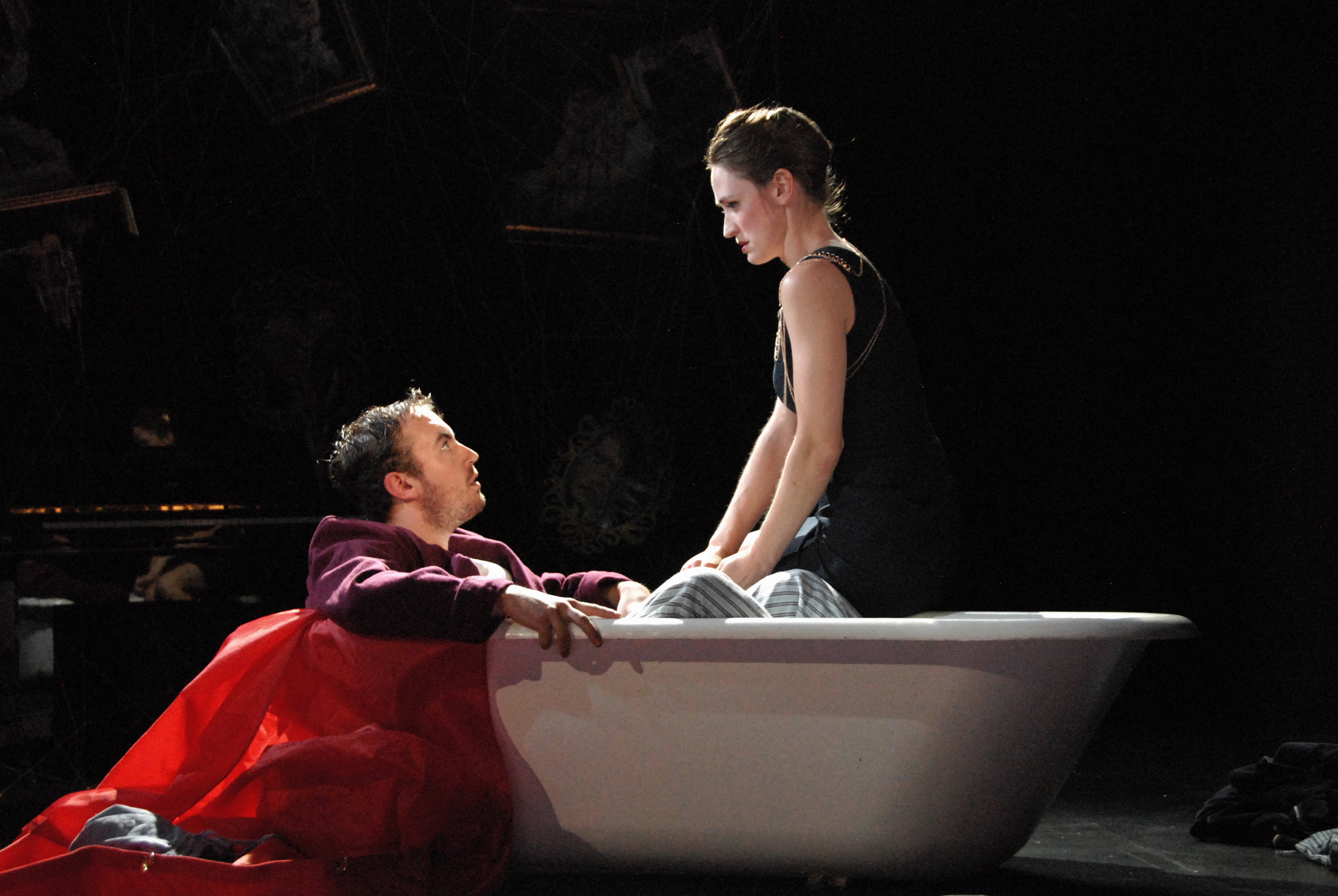Review of Phaedra’s Love, Yale Summer Cabaret
The Yale Summer Cab Co-Artistic Directors Jesse Rasmussen and Elizabeth Dinkova seem to have a thing for sensationalist modern reworkings of classical sources. In last year’s Cab season, Dinkova directed Rasmussen, among others, in Boris Yeltsin, Mickaël de Oliveira’s Portuguese revamp of Agamemnon, featuring a bored latter-day aristocracy ripe for overthrow; now Rasmussen directs, with Dinkova on hand in a small but important role, Sarah Kane’s slash-and-burn satire on royalty, class, faith, and, mostly, sex, Phaedra’s Love. In both, a mother figure is rather unhealthily concerned with her grown son’s or stepson’s sexuality. In Boris Yeltsin, the infatuation stops short of sexual contact. Not so in Phaedra’s Love.
Phaedra, whether at the hands of Euripides, Seneca, Racine, or Kane, is a woman driven to distraction by her lust for Hippolytus, only son of her husband, King Theseus. Her pursuit of Hippolytus generally leads to her being rejected by him and to the accusation that he raped her, which generally brings about his death through the outrage of Theseus, providentially returned from his mission to the underworld. With larger-than-life heroic figures involved, it’s hard to say where the moral force of the story should be, but the situation of a queenly woman doing bad things for love makes the tale a popular one to revisit. To say nothing of the older woman/younger man mythos.
Hippolytus (Niall Powderly), Phaedra (Elizabeth Stahlmann)
Kane’s Phaedra features a certain manic comic flair which, in Rasmussen’s rendering, mostly seethes below the surface. The Summer Cab version feels more tragic than one might expect, in part because camp, which could be a key factor in a contemporary tale this lurid, is relegated to a few minor touches. That leaves us with the indelible power of the key performances from Niall Powderly as Hippolytus and Elizabeth Stahlmann as Phaedra. The work they do is sizzling.
Powderly delivers Hippolytus, a masturbating, TV-watching, toy-car manipulating schlub in a tub, as every bit a tragic hero worthy of Shakespeare. Hippolytus is repulsively slovenly, but his detachment—from man, God, and woman—becomes at last a matter of moral heroism. It’s possible to see him that way when he accepts, scapegoat fashion, the charge of the rape and his grisly fate at the hands of a blood-thirsty populace, remarking “If there could have been more moments like this.” It’s a wonderful last line and feeds back into the play’s notion—which is what makes Hippolytus and Phaedra, oddly, soul mates—that living means feeling something unexpected, even out-of-bounds. No guts, no glory—which might mean, as here, pretty gory glory. With dead bodies enough to satisfy Shakespearean tragedy.
Kane is rather unsparing of Phaedra, a woman who forces herself upon her stepson and then feels outraged by her treatment at his coldly indifferent hands. Stahlmann, who I’ve seen in a variety of roles in her time at YSD, is revelatory, again. Here, her look speaks volumes as she walks the tightrope of Kane’s truncated lines. Phaedra is a stylish, self-possessed woman gradually becoming a basket-case, and her sense of her own worth is what she seems most eager to dispense with. Some might call her position masochistic, but that would be too extreme for a role that, one senses, we’re meant to see as endemic to the part sexuality reserves for women.
Phaedra (Elizabeth Stahlmann), Strophe (Bronte England-Nelson)
If we doubt that, we’ve only to look at Phaedra’s daughter, Strophe (Brontë England-Nelson, who wins the trifecta for performances this summer with another impressive turn in her third play of the season). Strophe initially seems to be more firmly wrapped than Phaedra until we realize the extent to which she is already wounded. A key reason to see this play is to see the excellent actors on hand—which includes Paul Cooper as a bemused doctor, a pondering priest, and a rather bloodless Theseus.
Kane is a shrewd playwright who knows how comic the bathetic can be, which means that the emotional hi-jinx on display make it seem risky to laugh, or it might even hurt to laugh, and that’s the point. Her heroines are serving themselves up on a spit, but that’s nothing to what their disaffected object of desire will get up to. Attentive viewers will catch the chuckle of naming Phaedra’s daughter Strophe and will notice how things shift to “Antistrophe” and “Catastrophe” as the play moves on—suffice to say, the shift is structured by certain oral acts, the last from a source that might be unexpected enough to satisfy even Hippolytus. Our hero, after all, mainly identifies himself with his guts and his cock, so we can say his end has all kinds of poetic justice.
And what about his mind? Kane gives Hippolytus a skeptic’s jailhouse colloquy with a priest that lets him vent about a life with no beliefs, and he cleverly turns the notion of forgiveness on its head, so that even the priest must concede the clarity of his moral code. That’s when we begin to see that Hippolytus isn’t simply sickened by being royal or by his dysfunctional family or by the depths those who desire him are willing to stoop to, but that, for him, there’s a needling fear of pointlessness forever in sight. And Powderly’s unflinching stare, with all this actor’s froideur and finesse, keeps that big empty elephant in the room, so to speak. Which, come to think of it, may be what makes him so irresistible to his step-mom. She wants to see him feel something. Too bad she’s not there for the end.
Hippolytus (Niall Powderly), Strophe (Bronte England-Nelson)
At a bit over an hour in length, Phaedra’s Love is the quickest of the shows this summer, and the scenes between Hippolytus and Phaedra are over too soon. The look of Phaedra and Strophe as high-toned dames is ably caught by killer dresses and accessories by Sarah Woodham, while the cobweb behind the lurid red curtain, the psychotic graphic swirls adorning walls, and that tub in baleful light center stage combine for the feel of funhouse horror that Fufan Zhang’s set and Andrew F. Griffin’s lighting conjures, much as Christopher Ross-Ewart’s soundstage of music and transmissions does, all vaguely unsettling.
Long ago, Villiers de L'isle Adam summed up the jaded aristocrat’s view with the line, “Living? Our servants can do that for us.” In Phaedra’s Love, the aristocracy are seen living out a kind of trailer trash version of a life even their servants might despise. And yet, for all the leveling of our crassly democratic age, it’s still rather cathartic to wallow with our betters in their gilded cesspool. And nothing makes that happen like theater. The Summer Cabaret ends its 2016 season with one fucked-up royal family hoist with its own petard.
Phaedra’s Love
By Sarah Kane
Directed by Jesse Rasmussen
Lighting Designer: Andrew F. Griffin; Composer and Sound Designer: Christopher Ross-Ewart; Costume Designer: Sarah Woodham; Set Designer: Fufan Zhang; Production Dramaturg: David Bruin; Movement and Violence Consultant: Emily Lutin; Production Manager/Technical Director: Alix Reynolds; Stage Manager: Emely Selina Zepeda
Cast: Paul Cooper; Brontë England-Nelson; Niall Powderly; Elizabeth Stahlmann; Ensemble: Elizabeth Dinkova; Sean Boyce Johnson; Kevin Hourigan
Yale Summer Cabaret
August 4-14, 2016








